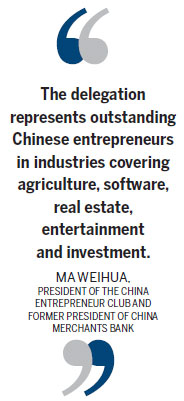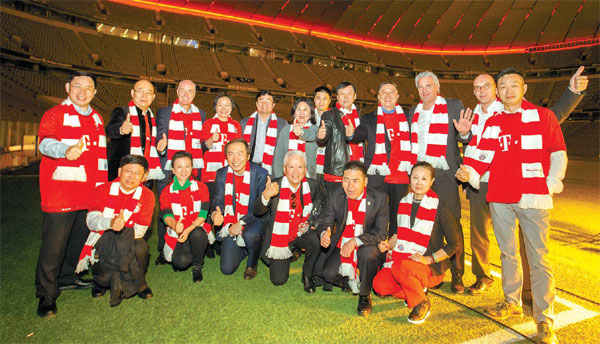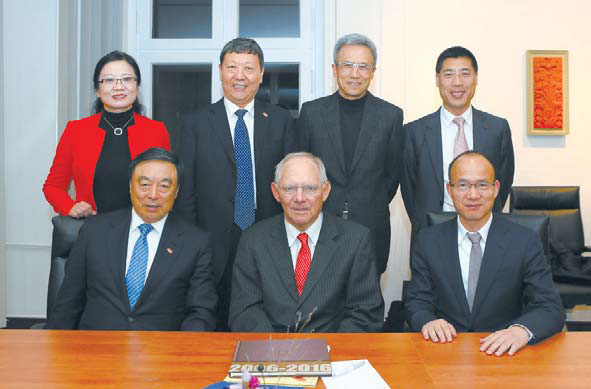In Berlin to build bridges, not walls

Chinese entrepreneurs visit Germany and Italy to seek greater understanding and common ground
Speaking in Germany's capital, the chairman of one of China's biggest investment companies noted this year's 25th anniversary of the collapse of the Berlin Wall to make a powerful point.
Guo Guangchang, chairman of Fosun International Ltd, said it is important to tear down the many invisible walls between countries that are hindering economic cooperation.
| Members of the China Entrepreneur Club visit soccer club FC Bayern Munich. The China Entrepreneur Club was established by 31 of China's most influential entrepreneurs, economists and diplomats. Photos provided to China Daily |
| Wolfgang Schaeuble (seated, center), Germany's federal minister of finance, met with the delegation from the China Entrepreneur Club on Oct 15. |
Those walls include unfair policies and the distrust and prejudice that people have about each other because of not understanding, he said.
"But we don't need walls, we need more bridges," he said at a roundtable meeting at the Federation of German Industries in Berlin.
Chinese and German entrepreneurs agree about the need to build bridges. While the countries have grown close in many ways in recent decades, misunderstandings, such as the meaning of China's economic transformation and the accompanying slowdown, still can mask opportunities and block fuller cooperation.
One of the bridges, however, was built this month, as more than 20 Chinese business leaders with the China Entrepreneur Club made an eight-day visit to Germany and Italy from Oct 13 to 22, which included some heart-to-heart discussions with their hosts.
The group also visited renowned enterprises in the two countries, including software maker SAP, carmaker BMW, soccer club FC Bayern Munich and winemaker Antinori.
The group taking part was composed primarily of private entrepreneurs from China. Since 2011, club delegations have visited the United States, the United Kingdom, France, Belgium, Australia and Singapore.
The China Entrepreneur Club was established by 31 of China's most influential entrepreneurs, economists and diplomats in 2006, and its members represent the first generation of modern Chinese entrepreneurs. Its 47 companies, most of which are privately owned, earn a total annual gross income of more than 2 trillion yuan ($314 billion; 277 billion euros).

"The delegation represents outstanding Chinese entrepreneurs in industries covering agriculture, software, real estate, entertainment and investment. We aim to enhance mutual understanding and communication, while uncovering investment and cooperation opportunities in key industries," says Ma Weihua, club president and former president of China Merchants Bank.
Learning from German entrepreneurs is an important aim of the trip, Ma says. Because China's industrialization came much later, Chinese companies' understanding of the international market still lags behind that of the best multinational companies, he says, adding that Germany's most valuable lesson is its persistent pursuit of quality and technology.
Wolfgang Schaeuble, Germany's federal minister of finance, met with the delegation. Topics included China's Belt and Road Initiative, which seeks to use trade and investment to boost ties to China along ancient trade routes and elsewhere, and Industry 4.0, a term born in Germany to describe the computerization of factories. Schaeuble says China has many companies with strong innovative abilities and he hopes to strengthen the business relationship.
He says Germany would like to increase use of dialogue mechanisms, pay more attention to the role and strength of entrepreneurs, and build more collaboration and communication platforms for the future.
German companies also told delegation members they are looking for opportunities in China. While visiting FC Bayern Munich, Chinese entrepreneurs talked about how to help the soccer club explore the Chinese market.
Joerg Wacker, a club executive, says the club has more than 400 million fans, of whom 90 million are in China. Bayern Munich has accelerated the building of its Chinese fan base this year, including three friendly matches in China in July. It has also opened an online store on Tmall, a business-to-consumer retail site in China.
"Of course we have seen China's opportunities, and we would like to explore the market more in the future," Wacker says, adding that the club is planning to establish an office in Shanghai to develop the market in China.
Guo says it is his fourth visit to Germany. As Fosun speeds up investments in Europe, he has already had contact with many German companies.
In July, Fosun acquired a majority stake in the German private bank Hauck & Aufhaeuser, after acquiring 19.2 percent of Germany's BHF-Bank last year.
"We wish to expand our investment in Germany," says Guo, adding that his company had built a global network of private banks with assets of $100 billion (113 billion euros).
He says helping small and medium-sized German companies - often leaders in niche industries - enter the Chinese market will also be an important part of his business.
While learning about the best practices of German companies, Chinese entrepreneurs also answered their German counterparts' queries about China's economy.
Wu Yajun, chairwoman of Longfor Properties, which does business in 24 cities in China and had sales revenue of more than 4.9 billion yuan last year, says the ongoing urbanization process in China will stimulate growth, which "should not be underestimated". Private consumption will be boosted, creating a huge market for high-quality products and services offered by Chinese and foreign companies.
"The number of people we serve in Chinese cities will increase to 1 million in two years from 600,000 now," she says. "Also in the third or fourth-tier cities, people's consumption ability has been increased very quickly, which should not be ignored."
She suggests that German companies invest in China's second-tier and third-tier cities, where there is lots of room to grow.
Xu Jinghong, chairman of Tsinghua Holdings, a state-owned high-tech company, talked about the boom in entrepreneurship in China in the past two years.
"Since 2014, China has seen about 10,000 new, small enterprises emerging every day," he says, adding that these new, vigorous companies will pave the way for long-lasting growth of the Chinese economy.
Xu says there will also be a need for technology innovation and innovation in business models. China has a huge market, but many companies still lack original technology and are following the steps of international leaders, Xu says. Germany has many original technologies that have not been applied to the market yet, so there will be a large space for cooperation.
"In the future, companies that look for long-term development have to first break down their own inner barriers and develop with an open and cooperative attitude," he says.
Xu says despite the economic slowdown, there also are new growth areas. Tsinghua Holdings has grown in the past three years, and by the end of this year, its assets will exceed $30 billion. He says the company will work to develop business in healthcare and environmental technologies.
Xu Xiaonian, an economist and professor of economics and finance at China Europe International Business School in Shanghai, who is a consultant with the club, says the outside world's confusion about China's economic slowdown derives from their misunderstanding of China's economic development models.
He says there have been two models, the first of which was from the start of reform and opening-up, which began in the late 1970s, until the mid-1990s.
"During this period, the government reduced the restrictions of the planned economy system on the market, and introduced creativity and vitality to the market and private capital," he says. In that period, the economy developed at about 10 percent annually.
But from the mid-1990s until now, he says, the Chinese economy's development has been based more on the government issuing currency and pursuing fiscal expenditures to drive growth. This model is based on the input of more resources rather than improvements in efficiency, so it is unsustainable.
Xu says the unsustainable economic growth mode has met with big difficulties, and the Chinese government and market are now engaged in economic transformation. That includes pushing forward economic reform, relying on the strength of market and private forces to produce innovation, improving efficiency and making Chinese economic growth sustainable. There will be some difficult times in the meantime, but China's potential and strength are still there, he says.
Ma, the club president, says the trend of Chinese companies going global won't be affected by the economic slowdown in China. Last year, he says, China invested in the largest number of projects it ever had in Germany, illustrating the determination of Chinese entrepreneurs to explore overseas markets.
chenyingqun@chinadaily.com.cn
(China Daily European Weekly 10/23/2015 page16)
Today's Top News
- Japan tempting fate if it interferes in the situation of Taiwan Strait
- Stable trade ties benefit China, US
- Experts advocate increasing scope of BRI to include soft power sectors
- New engine powers cargo drone expansion
- China to boost green industry cooperation
- Manufacturing PMI rises in November
































